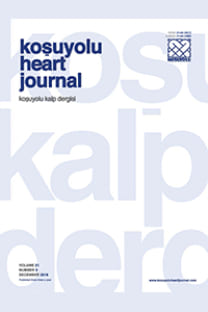Adaptation to Turkish of the Self-Care of Heart Failure Index: A Validity and Reliability Study
Selfcare, Selfcare, heart failure, validity, reliability
Adaptation to Turkish of the Self-Care of Heart Failure Index: A Validity and Reliability Study
Selfcare, heart failure, validity, reliability,
___
- 1. Virani SS, Alonso A, Benjamin EJ, Bittencourt MS, Callaway CW, Carson AP, et al. Heart disease and stroke statistics-2020 update: A report from the American Heart Association 2020;141(9):139-596.
- 2. McHorney CA, Mansukhani SG, Anatchkova M, Taylor N, Wirtz HS, Abbasi S, et al. The impact of heart failure on patients and caregivers: A qualitative stud. PLoS One 2021;16(3):e0248240. [Crossref]
- 3. Tokgözoğlu, L, Yılmaz MB, Abacı A, Altay H, Atalar E, Aydoğdu S, et al. Türkiye’de kalp yetersizliği yol haritasi kalp yetersizliğinin ve buna bağlı ölümlerin önlenmesi amacıyla geliştirilebilecek politikalara illişkin öneriler. TKD 2015:1-31.
- 4. Jackson JD, Cotton SE, Bruce Wirta S, Proenca CC, Zhang M, Lahoz R, et al. Burden of heart failure on caregivers in China: Results from a cross-sectional survey. Drug Des Devel Ther 2018;12:1669-78. [Crossref]
- 5. Riegel B, Dickson VV, Faulkner KM. The situation-specific theory of heart failure self-care: Revised and updated. J Cardiovasc Nurs 2016;31(3): 226-35. [Crossref]
- 6. Buck HG, Harkness K, Wion R, Carroll SL, Cosman T, Kaasalainen S, et al. Caregivers’ contributions to heart failure self-care: A systematic review. Eur J Cardiovasc Nurs 2015;14(1):79-89. [Crossref]
- 7. Badır Durademir, A. Kronik kalp yetmezlikleri hastaların yaşam kaliteleri ve öz-bakım davranışları. İç Hastalıkları Hemşirelik Programı Yayınlanmamış Doktora Tezi, İstanbul; 1998.
- 8. Baydemir C, Özdamar K, Ünalır A. Validity of the Turkish version of the European heart failure self-care behavior scale. Anadolu Kardiyol Derg 2013;13:573-9. [Crossref]
- 9. Jaarasma T, Stromberg A, Martensson J, Dracup K. Development and testing of the European heart failure self-care behaviour scale. Eur J Heart Fail 2003;5(3):363-70. [Crossref]
- 10. Lyngå P, Fridlund B, Langius-Eklöf A, Bohm K. Perceptions of transmission of body weight and telemonitoring in patients with heart failure?. Int J Qual Stud Health Well-being 2013;8(1): 21524. [Crossref]
- 11. Barbaranelli C, Lee CS, Vellone E, Riegel B. Dimensionality and reliability of the self-care of heart failure index scales: Further evidence from confirmatory factor analysis research. Res Nurs Health 2014;37(6):524-37. [Crossref]
- 12. Riegel B, Carlson B, Moser DK, Sebern M, Hicks FD, Roland V. Psychometric testing of the self-care of heart failure index. J Card Fail 2004;10(4):350-60. [Crossref]
- 13. Riegel B, Barbaranelli C, Carlson B, Sethares KA, Daus M, Moser DK, et al. Psychometric testing of the revised self-care of heart failure index. J Cardiovasc Nurs 2019;34(2):183-92. [Crossref]
- 14. Seçer İ. Psikolojik test geliştirme ve uyarlama süreci: SPSS ve LISREL uygulamaları. Anı yayıncılık, 2015.
- 15. DeVellis RF, Thorpe CT. Scale development: Theory and applications. Sage publications, 2016.
- 16. Johnson RB, Christensen L. Educational research: Quantitative, qualitative, and mixed approaches. Sage publications, 2019.
- 17. Ávila CW, De Maria M, Vellone E, Riegel B, Bernardes D, Silveira LJ, et al. Psychometric characteristics of the caregiver contribution to self-care of heart failure ındex in a South American population. J Cardiovasc Nurs 2020;35(5):435-44. [Crossref]
- 18. Havva Öz Alkan, Nuray Enç. Kalp yetersizliğinde evde bakım. Turk Soc Cardiol Turkish J Cardiovasc Nurs 2015;6(9):27-41. [Crossref]
- 19. Akbıyık A, Koçak G, Oksel E. Kronik kalp yetmezliği olan hastalarda öz-bakım davranışlarının incelenmesi. İzmir Katip Çelebi Univ Sağlık Bilim Derg 2016;1(2):1-8.
- 20. Doğu Kökçü Ö, Tiryaki Ö. Kalp yetmezliği hastalarının öz bakım davranışları ve bakım gereksinimlerini karşılamada bağımsızlık durumlarının incelenmesi. OTJHS 2020;5(2):364-74. [Crossref]
- 21. Riegel B, Lee CS, Dickson VV, Carlson B. An update on the self-care of heart failure index. J Cardiovasc Nurs 2009;24(6):485-97. [Crossref]
- 22. Vellone E, Riegel B, Cocchieri A, Barbaranelli C, D’Agostino F, Antonetti G, et al. Psychometric testing of the Self-Care of Heart Failure Index Version 6.2. Res Nurs Health 2013;36(5):500-11. [Crossref]
- 23. Chen W, Lin P, Li L. Reliability and validity of the Chinese version of self-care of heart failure index. Chin J Nurs 2013;48(7):629-31.
- ISSN: 2149-2972
- Yayın Aralığı: 3
- Başlangıç: 1990
- Yayıncı: Ali Cangül
Dilek YAVUZCAN ÖZTÜRK, Behzat TÜZÜN
Relationship Between Syntax Score and Cystatin C in Patients with Acute Coronary Syndrome
Oğuzhan BİRDAL, Mehmet SAYGI, Pınar DEMİR GÜNDOĞMUŞ, Emrah AKSAKAL, Flora ÖZKALAYCI
Yalçın AVCI, Mustafa DURAN, Ali Rıza DEMİR, Gökhan DEMİRCİ, Ömer TAŞBULAK, Arda GÜLER, Ahmet Arif YALÇIN, Sezgin ATMACA, Mehmet ERTÜRK
Should We Hesitate to Use Skeletonized Bilateral Internal Mammary Artery?
Adaptation to Turkish of the Self-Care of Heart Failure Index: A Validity and Reliability Study
Füsun AFŞAR, Serpil KAYALI, Vildan KESGİN, Taylan AKGÜN, Habip YILMAZ
Gökhan DEMİRCİ, Serkan ASLAN, Ali Rıza DEMİR, Begüm UYGUR, Ayan IŞIK, Enes ARSLAN, Mehmet ERTÜRK
Abdulkerim ÖZHAN, Murat BAŞTOPÇU, Cemal KOCAASLAN, Mehmet Şenel BADEMCİ, Ahmet ÖZTEKİN, Fatih Avni BAYRAKTAR, Betül Nur KESER, Ebuzer AYDIN
